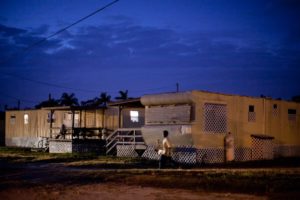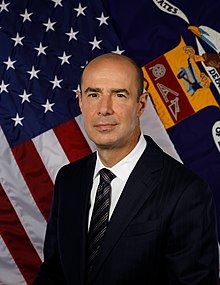Labor Department Won’t Stop Corporate Abuses of ‘Essential’ Laborers; High COVID Rates, Wage Cuts, Squalid Housing
Donald Trump is making it easier for U.S. growers to profit off a system of “government-sanctioned human trafficking,” a practice that also appears to be worsening the coronavirus pandemic.
At issue is a federal visa program called H-2A that allows foreign workers to manage and pick crops, low paid work few Americans are willing to do.
Farmworker advocates call the H-2A visa program “intrinsically abusive.” They characterize it as a scheme that ties migrant workers to the whims of a single employer.
Migrant farmworkers who asked for masks but were told by the boss — ‘There is the door.’
“The program is structured in such a way that there is a huge power imbalance that favors employers versus workers,” Maria Perales Sanchez of Centro de los Derechos del Migrante Inc. (CDM, Center for Migrant Rights) said. CDM spent five months between September 2019 and January 2020 interviewing H-2A workers across Mexico to understand their conditions. It found systemic violations of basic worker rights.
Universal Abuse
“One hundred percent of those surveyed reported at least one illegal abuse of their rights — 96% of them reported three or more. Abuses accumulate and put workers at even more risk,” Perales Sanchez said.
The farmworkers worked largely in Florida, but also Georgia, Washington and North Carolina. They reported violent attacks, verbal abuse and sexual harassment.
“We have seen the Trump administration consistently fail to enact enforceable protections and standards for agricultural workers, and specifically H-2A workers,” Perales Sanchez said.
Now the Trump administration is changing the rules in ways that will make migrant farmworkers even more vulnerable to the worst employers.
“The H-2A program is easing regulations for employers, making it easier for them to have access to workers,” Perales Sanchez said. “We’re not seeing workers’ rights and protections. In the context of COVID, this puts them at greater risk. There’re no enforceable protections.” That means the risk of workers contracting the COVID-19 and spreading it increases.
Lawsuit Filed

The company’s lawyer, Michael Stroster, issued a statement denying any problems.
“We take the allegations made by former contracted workers very seriously and find it particularly disturbing that anyone would allege that Four Star withheld payments, threatened contracted workers, attempted or was involved in any way with deporting any individual who worked at its facility. That is simply not true. We are extremely confident that Four Star acted appropriately and lawfully at all times and that the allegations levied against our company will be dismissed in their entirety.”
The company said it is “dedicated to complying with applicable laws, rules, and regulations and ensuring a safe workplace for all.”
Endure or Leave
Ben Botts, the CDM legal director, noted that migrant farmworkers in the H-2A program who are hired by abusive employers have the “option to endure — or leave the country.”
“The trafficking law as written doesn’t have to include physical force — actually, it’s a lot more widespread than that. Workers are vulnerable — [the bosses] use the coercive power they know they have over workers.”
Last year, the Department of Labor approved 257,000 H-2A visas, according to Farmworker Justice, a non-profit organization fighting on behalf of seasonal and migrant farmworkers.
Overall, there are 2.5 million farmworkers in the U.S. That doesn’t count poultry and meatpacking plants. The overwhelming majority — 83% — are immigrants. Half are undocumented.
Anemic labor protections mean farmworkers — and especially those in the H-2A program – are forced to live in cramped housing conditions that make them exceedingly vulnerable to COVID-19.
“We’re seeing this played out in a few different ways,” Emma Kreyche, a senior worker rights advocate at the Worker Justice Center of New York, told me.
Fake Quarantine

“There are some guidelines in place for placing H-2A workers that are arriving in New York from other countries into a kind of precautionary quarantine,” she said. “However, this isn’t a true quarantine in the sense that we’re accustomed thinking about it because it really just calls for workers who arrive together to stay together in housing that is separate from other workers.”
The efficacy of the quasi-quarantine practice is dubious, Kreyche said.
“We have seen mixed results and mixed reports,” Kreyche says. “One concern we have — because, again, workers are being housed together, if there’s one worker contaminated in a group of 20 or 40, who have traveled together — then the likelihood of infection spreading within that group is unmitigated by this practice. Secondly, we have heard reports where these workers are, in fact, being housed with other individuals who have been on the farm for longer periods of time. So, you might have several people housed together in a trailer and there are new people coming and going without much clear organization or sense of quarantine.”
Other concerns revolve around poorly communicated safety protocols and the lack of testing.
“There isn’t available testing for the most part for workers that are asymptomatic,” Kreyche adds. “So, until we have some kind of testing regimen for seasonal workers that are coming onto a farm, it’s really hard to protect them or their coworkers. In most rural counties, if you don’t have transportation, if you don’t have health insurance, it can be very difficult to get tested if you’re asymptomatic.”
The Food & Environment Reporting Network puts the number of COVID-19 positive farmworkers at 7,718 nationwide with nearly 20 fatalities.
Administration Does Nothing to Help
So far, the Trump Administration has ignored calls for reforms to protect the health of workers.
Instead, Trump & Co. accelerated the H-2A visa program by relaxing rules meant to give preferences to U.S. workers, loosening housing, and other labor protections. That paved the way for deep wage cuts for already poorly paid migrant farmworkers.
“The Trump Administration has gone out of its way to make it easy for agricultural employers to bring in guest workers during the pandemic,” Bruce Goldstein president of Farmworker Justice, told DCReport. “They’ve eased certain processes. And yet the Trump administration has refused to require safety protections during transportation to the U.S. in housing or in the workplace.”

The U.S. Department of Labor under Trump-appointed Labor Secretary Eugene Scalia, openly rebuffed farmworker advocates and their calls for job safety requirements over the summer and, instead, touted the issuance of COVID-19-related “guidance,” saying, in part, “State and local governments are best suited to know and understand the pandemic and appropriate response at their level.”
Whitney Ford, head of the Labor Department’s Division of Immigration and Farm Labor, sent Goldstein a dismissive letter typical of the attitude of the Trump Administration toward workers, especially workers of color.
“You suggested numerous enhancements to the H-2A program to address safety and health concerns related to housing, transpiration, social distancing at work, paid medical treatment, and specific disclosure requirements related to COVID-19,” Ford wrote. “Many of these suggestions are beyond the scope of the Department’s authority. The Department will continue to closely monitor the COVID-19 pandemic as it relates to farmworkers, issue guidance and promulgate regulations as appropriate if Congress enacts new legislation.”
Anti-Labor Appointments
Scalia, an anti-labor lawyer and the son of the late right-wing Supreme Court Justice Antonin Scalia, became Labor Secretary in 2019. Trump named him after Alexander Acosta resigned in disgrace over a sweetheart deal that he gave child sex trafficker Jeffrey Epstein in 2008, when Acosta was U.S. Attorney from the Southern District of Florida.
Prior to Acosta, Trump had tried and failed, to install fast-food CEO and virulently anti-worker advocate Andy Puzder to head of the Labor Department in 2017. Puzder ultimately took himself out of contention after allegations of wife-beating surfaced.
This week, the U.S. Department of Agriculture canceled the Farm Labor Survey of agricultural employers — a metric the Department of Labor uses to set the main minimum wage under the H-2A agricultural guest worker program.
Without that survey, farmworker advocates say both U.S. agricultural workers and migrant farmworkers enrolled in the H-2A guest worker program are in for massive wage cuts.
Juan Antonio Zuniga is a 68-year-old farmworker who puts in 10-hour days, six-days-a-week and somehow manages to help the Rural and Migrant Ministry in New York State organize other vulnerable workers. The El Salvadoran emigre told me that he would love to help organize H-2A workers, too, but that they are hard to access. His son, a construction worker, has COVID. He also knows many farmworkers, who have gotten sick with the coronavirus.
“The farmworkers next door have gotten sick,” Zuniga said through an interpreter. “They asked for masks but were told by the boss — ‘There is the door.’”
Featured imaged: Workers in Immokalee, Fla., the nation’s “tomato capital.” (Coalition of Immokalee Workers)





